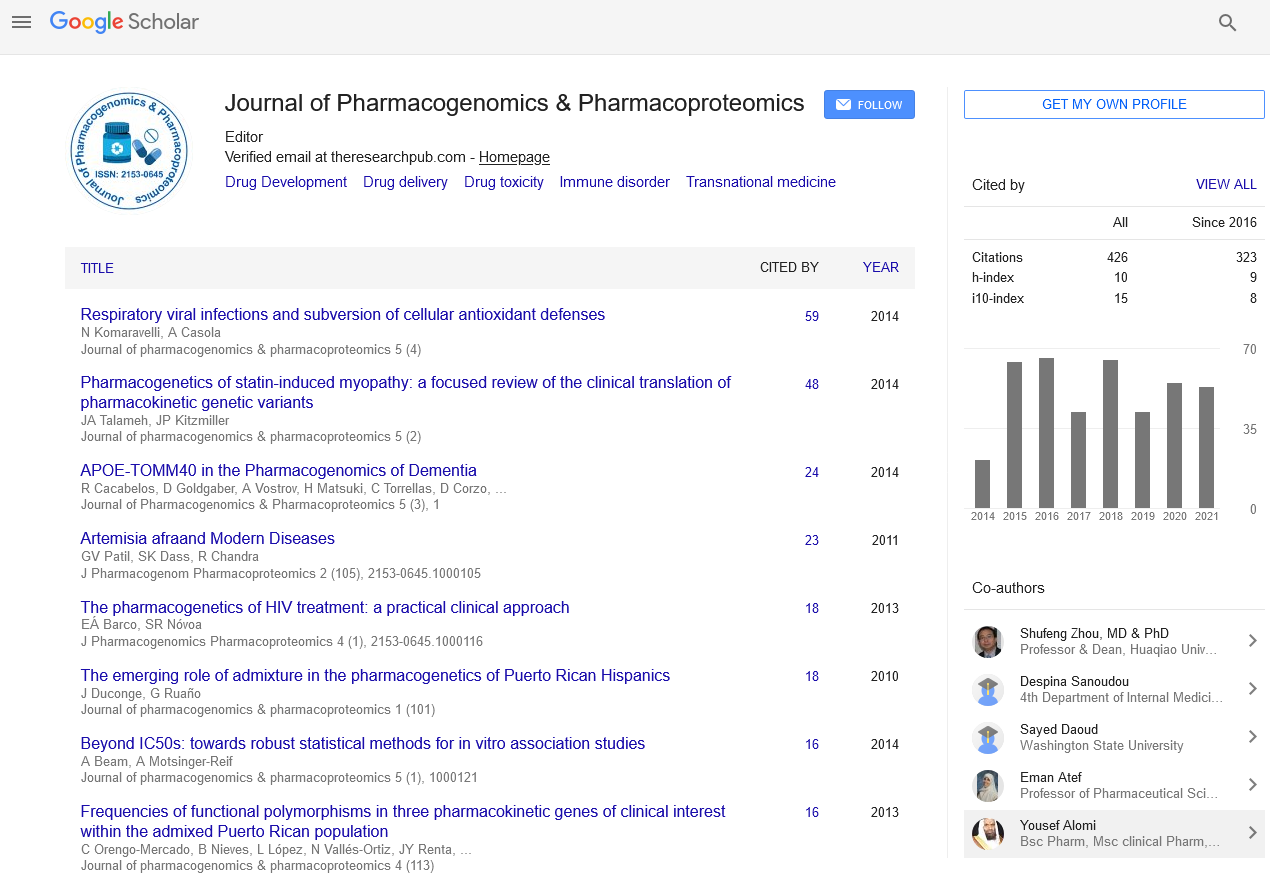Indexed In
- Open J Gate
- Genamics JournalSeek
- Academic Keys
- JournalTOCs
- ResearchBible
- Electronic Journals Library
- RefSeek
- Hamdard University
- EBSCO A-Z
- OCLC- WorldCat
- Proquest Summons
- SWB online catalog
- Virtual Library of Biology (vifabio)
- Publons
- MIAR
- Euro Pub
- Google Scholar
Useful Links
Share This Page
Journal Flyer

Open Access Journals
- Agri and Aquaculture
- Biochemistry
- Bioinformatics & Systems Biology
- Business & Management
- Chemistry
- Clinical Sciences
- Engineering
- Food & Nutrition
- General Science
- Genetics & Molecular Biology
- Immunology & Microbiology
- Medical Sciences
- Neuroscience & Psychology
- Nursing & Health Care
- Pharmaceutical Sciences
Development of a new predisposition SNP-panel focused on customized diet and physical activity setting
2nd International Conference on Predictive, Preventive and Personalized Medicine & Molecular Diagnostics
November 03-05, 2014 Embassy Suites Las Vegas, USA
Cristina Patassini, Daniela Zuccarello, Cristina Poggiana, Ludovica Dusi and Laura Francesca Rienzi
Scientific Tracks Abstracts: J Pharmacogenomics Pharmacoproteomics
Abstract:
Development of obesity has been associated with inadequate dietary and sedentary habits, as well as a genetic predisposition. Single Nucleotide Polymorphisms (SNPs) in several genes encoding for proteins involved in hypothalamic control of food intake, energy balance and lipid metabolism have been associated with common (non-Mendelian) obesity. A panel of SNPs that allows analyzing 5 genes through real-time PCR was developed. FTO gene codes a protein expressed in the hypothalamus which plays an important role in appetite regulation and food intake. LEPR gene codes the leptin receptor, an adipocytespecific hormone that regulates the amount of adipose tissue by a direct effect on the hypothalamus. DNMT3B gene codes a protein that modulates the status of DNA methylation, important for the regulation of food intake. Homozygous mutated subjects for the 3 SNPs above mentioned have a 6-8 times increased risk to develop obesity. THRA gene codes thyroid hormone receptor that regulates energy metabolism, glucose and lipid metabolism, food intake and oxidation of fatty acids. Carriers of mutated variant that consume high amounts of saturated fats have a 3-fold risk of developing obesity. ADRB2 gene codes the beta2-adrenergic receptor, involved in lipolysis and obesity development. Carriers of mutated variant are less able to burn fat stores after exercise. The analysis of these genes allows obtaining useful information for the proper setting of a diet and a customized physical activity.
Biography :
Cristina Patassini obtained her second degree in Health Biology in 2011, after a first degree in Medical Biotechnology in 2005, and a Master degree in Molecular Pathology and Biotechnology in 2006. She is the Executive Director of the Genetyx Lab in Marostica (VI). She has published 10 papers in reputed journals and she gave several lectures in National and International Congresses.


